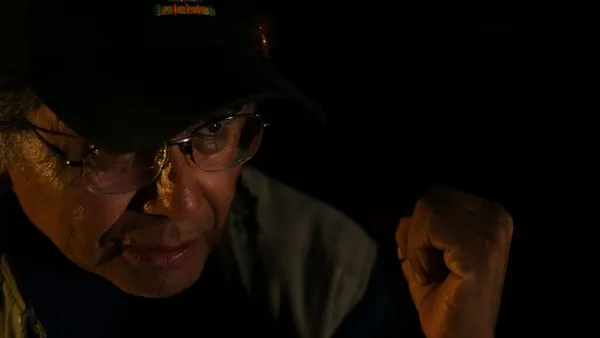 |
| Al Moon in New Beginnings. Vivianne Perelmuter: 'The way he faced himself, was all the time a surprise and not – it's both' Photo: Vivianne Perelmuter/Isabella Ingold |
In their latest documentary New Beginnings (Les Recommencements), French filmmakers Isabelle Ingold and Vivianne Perelmuter follow Native American Al Moon as he decides to take a road trip to meet fellow veterans of the Vietnam War who he hasn’t seen for more than four decades. The film not only follows his physical journey from the Yurok Reservation in California across the Midwest but also gives him time and space to express his philosophy on life. Through the course of the film layers of trauma accrue like sediment as the personal, the cultural and the national overlap.
When I caught up with the directors shortly after New Beginnings had its world premiere at Visions Du Réel, they explained how the film all began with a chance encounter at a launderette.
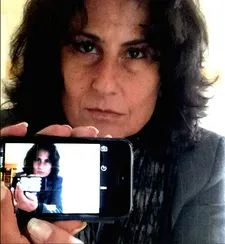 |
| Vivianne Perelmuter on her working relationship with Isabelle Ingold: 'I am the first move and she’s the second deepest movement' Photo: Vivianne Perelmuter |
“He was looking for someone from abroad,” Ingold recalls. He was hoping that they could translate a song for him and picked Perelmuter because she was wearing two-tone shoes. “He knew we were European by my shoes,” Perelmuter said, adding: “But we didn't guess he was Native American and we didn't guess he was a Vietnam veteran because we didn't know how to read the features that are very mixed and the the badge on his cap.
Perelmuter continues: “One thing was very peculiar, he has a way of speaking, you know, when you feel like someone is thinking while speaking – that is very raw and at the same time articulate.”
The next day the trio had dinner, where Moon proposed to take them to see the Yurok reservation. While they were on the trip, he explained his plan to take the road trip to see the other veterans and, two weeks later, when the pair had returned to France, they got in touch with him to propose following him with the film. The subsequent project took six years to complete.
There's a sense of sort of layered trauma. Moon’s personal trauma, some of which we learn about very late on in the film, but also that sort of cultural trauma from a Native American perspective and the national trauma of US involvement in the Vietnam War.
“Something was in the air,” says Perelmuter. “At the same time, the way he put it, the way he faced himself, was all the time a surprise and not – it's both. We don't want to film an identity. No, we film a being and sure the history, traumas – individual and collective – he carries that and it will sweat somehow, but we don't look to grab someone and say, ‘Now explain your thing’, we really don't want to fall into this trap.”
She adds: “It’s not just respect, because ‘respect’ is a bit smooth. It’s to keep the mystery of someone. That someone can be your friend, your lover. To give the person you are working with the space and the pace to unfold things to us and to himself. That's the point, it's the process of becoming, it’s for us, before the viewers, but it's also for himself and that's very moving for us. We felt that for this man it was his last chance to become something and to free himself from something. It was a trip of emancipation somehow. But we didn’t know there was a layer of forgiving himself.”
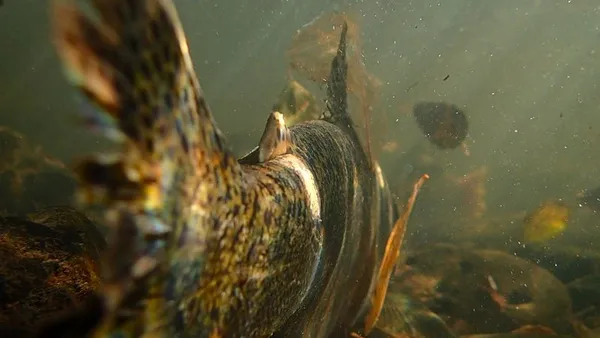 |
| Isabelle Ingold: 'It was really important for us to shine a light on this threat of losing the salmon' Photo: Vivianne Perelmuter/Isabella Ingold |
“He was looking for foreign ears and gaze,”says Perelmuter, “because nothing is obvious to us. So there are misunderstandings and there were times when Al said,’Something is lost in the translation and sometimes you don't get what's going on’.
Perelmuter explains that that’s all part of the process, as the back and forth over misunderstandings means that they were building a relationship.
“There is a freshness in this misunderstanding. The gap between us gives us the space to relate to each other and for him to have the impulse to reconsider himself.”
The road trip flows through the film but this was, in fact, the first thing that the filmmakers shot, then returning to the Yurok reservation to learn more about it and the salmon which live in the Klamath River which runs through the reservation, coming back each year to spawn. This idea of returning – and the physically exhausting journey the fish make to do it – is employed by the directors to add structure to the film.
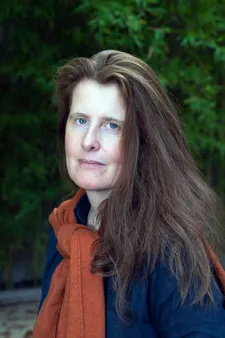 |
| Isabelle Ingold on her working relationship with Vivianne Perelmuter: 'We like to work together because we are very different' Photo: Vivianne Perelmuter |
Another crucial element of the film is voice-over from Moon, in which he gives free rein to his thoughts. In addition to deepening the level of insight, it also gives a sense of him being able to shape the film in collaboration with the directors rather than just being a subject who is filmed.
Ingold explains: “We worked on the first draft of the film using the interview and letters we had exchanged, then the last time we made the trip we did a recording with him of the first draft. Then we came back to Europe and worked on the editing for three years. Then we came back to him to do the final recording and with some adjustments that we made together. And then we worked again on the editing and we came another time to do another recording. By the time we came, Al had had a major stroke. So he’s in a wheelchair now and his voice had changed, he was not able to control it in the same way. So we agreed together that it would be a whisper because that was easier for him. So there are layers, some of which were the first recordings, some when we were in conversation and some where he was whispering.”
The whispering, in fact, adds an unexpected intimate element to the film. Perelmuter says: “Movies teach us how to face life – things that we didn’t expect, things that we would have liked not to have happened. But then, something that we didn’t choose – Al having to whisper – became something we did choose because there is something very intimate about it, as if he's speaking to our ears, not projecting. He’s speaking to us but also to himself and that’s the space of the movie, when someone is facing himself or his own image.”
She adds: “Al is an outsider and we really like outsiders. They don’t fit in the frame – no matter what frame. He is, at the same time, very articulate and thoughtful but very difficult. We had some tension, some fights because people who have been hurt become a bit paranoid. Also he’s a solitary person, so spending 24 hours together…
Ingold says: “But at the same time, he’s someone who likes to write, he likes to talk, he likes to articulate his thoughts. So I think the process of doing it was very nice for him.”
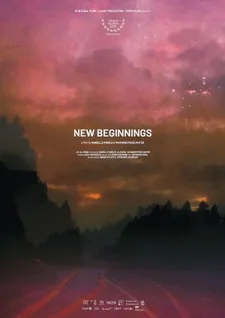 |
| New Beginnings poster |
As for their own collaboration, Ingold says: “We like to work together because we are very different. Vivianne is mostly doing the image and I’m mostly doing the sound. She’s very good at having a relationship with people and making every moment intense, very special and deep and I’m a more practical person.”
Perelmuter adds: “The thing is that we expose ourselves. We tell stories about ourselves so that the other [person who is the subject of the film] can also tell stories if he or she wants. I go to people. Isabelle is more shy but she is more precise, she will remember everything. I am the first move and she’s the second deepest movement.”





















